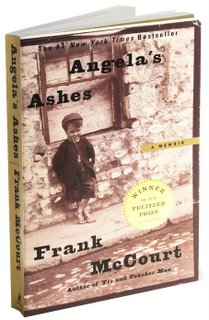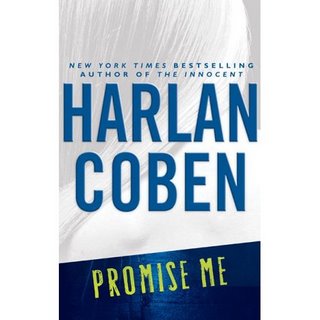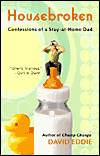
written by Frank McCourt
Wow. Just... wow. I had heard that this book was intense, and I had been wanting to read it for a while now, but oh my word. I was not prepared for how desperate Frank McCourt's Irish Catholic childhood was. It was so eye-opening, to read this man's very personal story of growing up in the poorest of poor slums in Limerick, Ireland.
The memoir chronicles the story of how Frank's parents met and married, his early years as the eldest child in an Irish immigrant family in New York, the family's return to Ireland, and the many desperate events and circumstances that characterized his life as he grew from boyhood into being a young man of his own.
In my opinion, it's an important book to read because most of us have no idea what it's like to live without comforts and trappings. But do be aware that the book has some unsavory explicit parts that aren't appropriate for younger readers.
Really cool elements:
- I admire McCourt for finding humor and joy in a most unexpected place: a childhood plagued by alcoholism, depression, loss, and astonishing poverty. Amazingly, though the book documents some very sad events, it doesn't really feel like a sad book. It's a beautiful testament to the resilience of the human spirit. I guess it's because the way McCourt chooses to muscle through his struggles, learning and growing all the while, rather than allowing them to define him and victimize him. I hope at the end of my life I can say that I did the same. (Though after reading his story, I have a hard time pointing to any area of my life that would qualify as hardship.)
- I've heard some complain that the book could be shortened by at least a few hundred pages because of the repetitive stories of McCourt's father's alcoholism. I disagree. I think to take out any of those portions of the book would be to downplay the severity of the disease and its impact on the family. Malachy McCourt struggled mightily to stay off the Guinness and hold a job, and though he seemed to love his family, his alcoholism made it impossible to provide for them, materially or emotionally. After knowing a few families who have been similarly broken by alcoholism, I'm all for McCourt telling it like it is, painful details and all.
Not-so-cool elements:
- McCourt writes the entire book from a child's point of view, which means the story is somewhat stream-of-consciousness, with very few complete sentences and only about half the required punctuation. If that kind of thing bugs you, you might find it kind of tedious to get through the book.
- Maybe I missed something, but I don't get the title. I know the book is as much about Frank's mother (Angela) as it is about himself, but where do the ashes come in? I guess I thought there would be something about his mom dying and him doing something with her ashes, but there's nothing like that. Or is the title a reference to the ashes of the Woodbine cigarettes she always smoked? Or maybe the cold ashes in the fire, since the family always lacked enough fuel to have a warm, cozy home? I don't know — I didn't see a strong enough connection to figure it out.
- The book ends kind of weird. The final installment in McCourt's memoir depicts him finally making his way back to America at age 19 to secure gainful employment. He immediately has a fling with a married woman, and that's the end of the book. It's not that I think he should gloss over this or pretend it didn't happen — this is a memoir after all, and if it happened, it happened — but it was such a disappointing ending. Is he implying that after all he's been through, he's really the boss of himself now and can do what he wants? Or that he's become enlightened enough to be above the church-manufactured sin/guilt complex that plagued him as a child? I don't know. I just know that I would've liked to see more profundity — some kind of significant parting statement, I guess — after such a provocative book. I wanted to find out more about whether he found fulfillment and purpose once he returned to America, and how he gained some closure to his fractured family relationships. But I guess that's what second books are for. Guess I have to add 'Tis to my library list...






